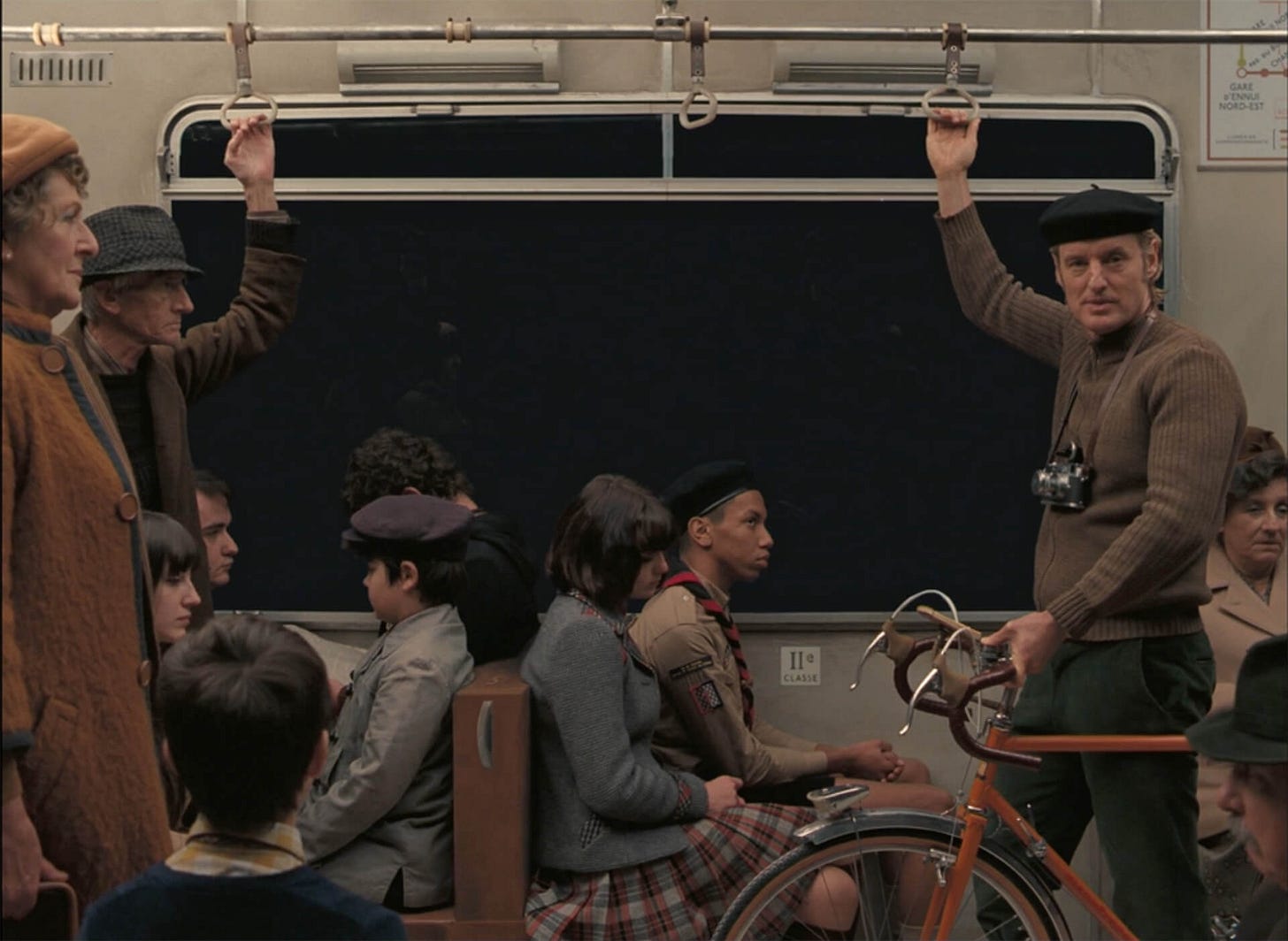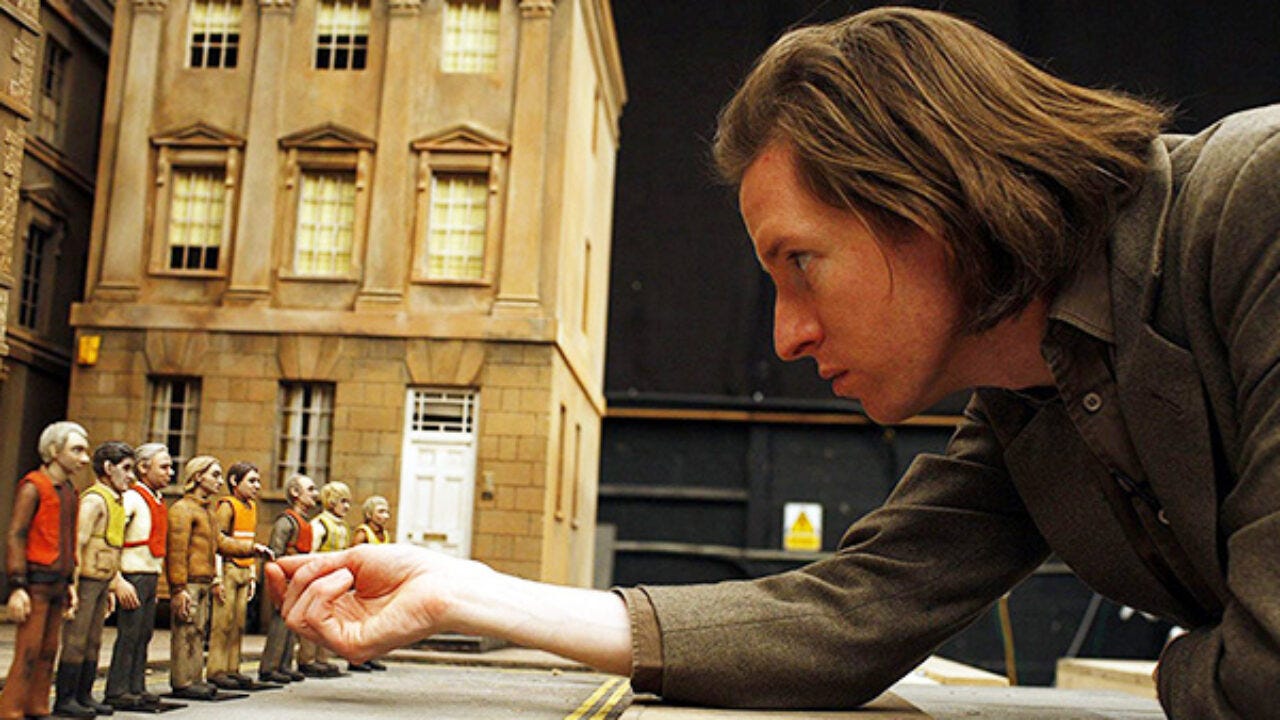‘The French Dispatch’: Selfless, Cold, and Composed
Wes Anderson has reached his true form, and he may have forgotten how to be human.
I recently watched Wes Anderson’s The French Dispatch, his love letter to The New Yorker and a bygone age of Cool Expatriatism1. These days, Anderson’s style has hardened into such a distinct and rigid form he is truly a filmmaker you either detest or adore, with very little room in-between2. I was very much in the “adore” category through his first three films3, and have struggled with his increasingly mannered style ever since. The one late-period Anderson film I’ve really enjoyed was The Grand Budapest Hotel, which is where his overall visual style solidified:
Painstakingly artificial sets
Scenes blocked as if he’s filming a stage play
A direction style that mimics Anderson telling his actors that he plans to take a photograph but then hits video on his phone instead
Bursts of animation
Lingering closeups
Changes in aspect ratio and film stock
A thick smear of what appears to be 1960s Oil over the color scheme
Now, I’m not here to shit on Wes Anderson. I respect the fact that the man has a distinct style and an artistic vision he pursues, and it really doesn’t matter if one cranky asshole in New Jersey likes it or not4. But! While watching The French Dispatch, I was struck by the fact that Anderson really has settled into this formula—it is the Anderson Style at this point. And I was also struck by the fact that his approach worked really, really well in The Grand Budapest Hotel but left me extremely bored in The French Dispatch. So I started thinking about what was missing from the latter, and I think I have figured it out: Characters who seem like actual human beings5.
A Bowl of the Hot Bird Water
To be fair, the characters in Wes Anderson films have always had the affect of aliens recently arrived on Earth and trying desperately to appear like seasoned locals6. That’s actually always been part of the charm of his films! But what was once a hint of characters as off-putting homunculi has become distressingly prominent. With each successive Anderson film, his characters have become less human and more like approximations of humans7.
This is the key problem with The French Dispatch: The stories aren’t really about people doing people things, because that isn’t what Anderson and his film are interested in. The film is really about this adorable fantasy version of Paris he’s created, the city of Ennui, and the stories he’s set there are more about mood, vibe, and concepts. Student protesters don’t behave in any recognizably human way, communicating with police via chess moves, women fall in love with sociopathic murderers, and pose nude for them despite being their prison guard, police casually poison child kidnappers on the assumption that the kidnapped child won’t partake due to a food preference8.
It’s a mistake to look for any sort of human logic in The French Dispatch, which is why it feels cold and clunky even to folks, like me, who want to love Anderson’s work. I love a bit of whimsy9 and I can admire Anderson's precision and dedication to the universe he’s creating. For me, as with many of Anderson’s less-enthused fans, he hit his high tide with Rushmore, perhaps the most perfect blend of actual human characters and Anderson’s theatrical and painted-miniature style. I keep hoping he returns to that balance and starts telling whimsical stories about real people again instead of whimsical stories set in elaborate alternate universes where police chefs are secret underground foodie superstars.
That’s why The Grand Budapest Hotel was a surprisingly terrific overall film (we’ll stipulate that The French Dispatch is a terrific Wes Anderson film, but not an overall success due to the diabetic levels of whimsy it delivers straight to your veins): It combined everything that cloys in The French Dispatch with an actual story about human beings. There are recognizable motives and emotions in The Grand Budapest Hotel, not vague gestures at emotions in the service of ensuring we notice the meticulously detailed costuming10. An old man looks back on the foundational adventure of his life with mixed nostalgia and sadness. People stand up to fascism, flee killers who look alarmingly like Willem Dafoe11, fall in love, have regrets. The Grand Budapest Hotel is twee, yes, filled with animated sequences and ridiculously studied blocking—but there’s a human heart beating at the center of it that the tweeness serves. In The French Dispatch it’s the other way around—the occasional moments of actual real human feeling are there only to serve the twee12.
Hand on the Wheel

The lesson here is simple: If you’re a creator, you have to always ensure your hand is on the wheel of your tools and not the other way around. The moment you’re writing solely to produce an effect you lose the necessary emotion and human connection that brings your readers into the story and makes them care. Without that, they might admire what you’ve done, they might admit your skill, but they’ll never actually care13.
Which is precisely where Anderson lives right now. There’s much to admire in his newer films, but not much anyone cares about. Which also describes me when I decide to get fancy and actually wear pants when I go outside, because I make those pants look good.
Next week: Atlanta’s subtle horror vibe.
There was a time, apparently, where any American with $5 and a dream could live in a castle in some war-burnt city in Europe for years, eating lobsters and verbally abusing the locals. Wes Anderson wants those times back.
To be fair, this is the sign of a true artist in many ways: The ability to piss off half your potential audience. That’s how it is with my pantslessness-centric performance art: You either love the sight of my hairy legs, or you don’t.
The “revenge montage” sequence from Rushmore is *chef’s kiss* perfect.
Is “One Cranky Asshole in New Jersey” the new title of my memoir? HOW COULD IT NOT BE?
I review a lot of books, so I can tell you with absolute, grim certainty that this is a widespread problem. Many writers seem to have that face blindness disease, because their characters all look and sound the same.
Trying to pretend I’m a seasoned local is my usual strategy when entering unfamiliar situations. When I travel outside the country this leads to me to nod my head and enthusiastically agree with everything anyone says to me rather than admit I don’t understand. So, in conclusion, that’s why I’m currently considered AWOL from the French Foreign Legion.
Coincidentally, “approximation of human” perfectly describes my fashion sense. Also: My haircut.
If any of that seems like reasonable human behavior to you, congratulations! You are a monster.
Anyone who says otherwise, I will punch in the nose. Whimsically.
How they didn’t win an Oscar for Best Special Effects: Timothy Chalamet’s Mustache Edition, I’ll never know.
Willem Dafoe is inherently terrifying. If you murdered someone and your excuse was “He startled me and he looked a little like Willem Dafoe,” no jury would convict you.
With one exception, I think: During Jeffrey Wright’s turn as the restaurant critic who is swept up in the kidnapping of the police chief’s son, there’s a moment spared for an affecting monologue about the way food becomes salvation to an expatriate, noting with deep and affecting sadness that when you’re all alone in a strange place the idea that there is always a table ready for you at a restaurant is a powerful one. More of this, Anderson! You swine.
Of course, Anderson convinced folks to give him $25 million to make The French Dispatch and I can barely convince people to pay me $25 for a short story, so who’s the asshole here? Trick question: It’s always me.







Is Timothy Chalamet’s the most punchable face in human history? Yes. Did Wes Anderson somehow manage to make it even more punchable in The French Dispatch? Again, yes. If I ever encounter Timothy Chalamet in real life, will the end result be my acquittal because I successfully convinced a jury he looked a little like Willem Dafoe? Sadly not, because no one would ever believe I could confuse Twig Boy with Willem Dafoe. Guilty as charged, Your Honor. I will accept my sentence with equanimity, knowing I have rid the world of that face. You're welcome.
4 'Is “One Cranky Asshole in New Jersey” the new title of my memoir? HOW COULD IT NOT BE?'
I had trouble using dickhead in a title, so I think you should be prepared to find alternatives to asshole. Although I do admit that asshole perfectly describes some people I know. If asshole is a problem, I’m pretty sure butt hole will be no-no as well. While poopy head is situated at the opposite end of the body, it’s still a gamble. I suggest the medical term sphincter. “One Cranky Sphincter in New Jersey”? Nah, fuggedaboutit.